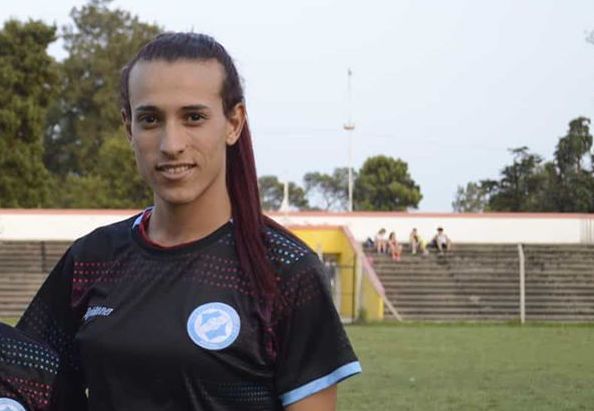Meet Mara Gómez, the woman poised to become the first trans professional footballer in Argentina

Mara Gómez is poised to make history as the first out trans player for a professional team in Argentina. (Instagram/vscffem)
Trans woman Mara Gomez is poised to become Argentina’s first professional transgender football player.
Gomez is currently waiting on a decision by the Argentine Soccer Federation on whether or not she’s made the league.
She spent years playing in local women’s league games in a suburb of Buenos Aires before being signed by Villa San Carlos, a first-division team.
“When I started I was so bad. I’d kick the ball at the goal and it would go anywhere,” Gomez told the Huffington Post.
But now Gomez is waiting to see if the signing will be authorised. While she waits for the federation’s decision, the 22-year-old’s phone constantly buzzes with messages of support.
While Argentina’s soccer federation doesn’t have any regulations on trans athletes, there is debate – like in many other countries and at Olympic level – about whether trans women should be allowed to play in professional women’s leagues.
People who oppose the inclusion of trans women in women’s sports tend to make the argument that they have an unfair advantage when it comes to height or strength.
Responding to these claims, Mara Gomez said: “On the field, you can have speed and strength, but that doesn’t help you if you don’t know how to play football.”
“I always hold up the example of Messi… He measures 1.6 meters (5 foot, 7 inches) and is the best player in the world.”
She also talked about a match early in her career when she faced complaints from the other team that she had an unfair advantage – even though she had played so badly she’d scored an own goal.
“They put me on defence but I didn’t know how to play well. I put a goal in my own net,” she said.
“When the first half ended I found out the other team had complained that I shouldn’t play because I put them at a disadvantage. They considered my sexuality a disadvantage for them even though I was playing so poorly.”
The Villa San Carlos coach, Juan Cruz Vitale, also rejected claims that Mara Gomez has an unfair advantage because of being trans.
He said that she first caught his eye because of her speed and her ability to score goals, and that “If we talk of strength, I have at least five or six girls who are stronger than her. On that side I don’t see that there is an advantage.”
Argentina has relatively progressive trans rights laws. In 2012, it gave trans people the freedom to change their legal gender without having to go before a judge, undergo surgery and face psychiatric assessments.

